CESA

E-book In Progress 3
This third edition of In Progress, Seminar on Social Sciences and Development in Africa brings together works by researchers and postgraduate students whose study and research theme is contemporary Africa and its development, supported by scientific currents that stimulate new approaches beyond the “development”, exploring the notions of “well-being” or “good living” and remaining close to currents of thought and debates between Africa, Asia and Latin America. The texts include themes such as: fieldwork: practical, theoretical and methodological issues; politics, civil society dynamics, development; culture, thought and change; strategies for cooperation and development; and populations, mobility and well-being. The second part of this work contains the reflections of the speakers invited to the In Progress 3 seminar, which include both a critical perspective on the dominant discourses and methodologies in the field of development policies linked to mobilities, economy and identities, as well as the contribution of financial growth for economic growth and several of the issues to be taken into account in discussions on economic sustainability, taking the example of SADC member countries. The final conference refers to the times and questions that are important to retain and what is important to reflect on in the context of social and human sciences, in particular, when the debate is about the (neo)colonial perspective and contemporary global challenges for African Studies.
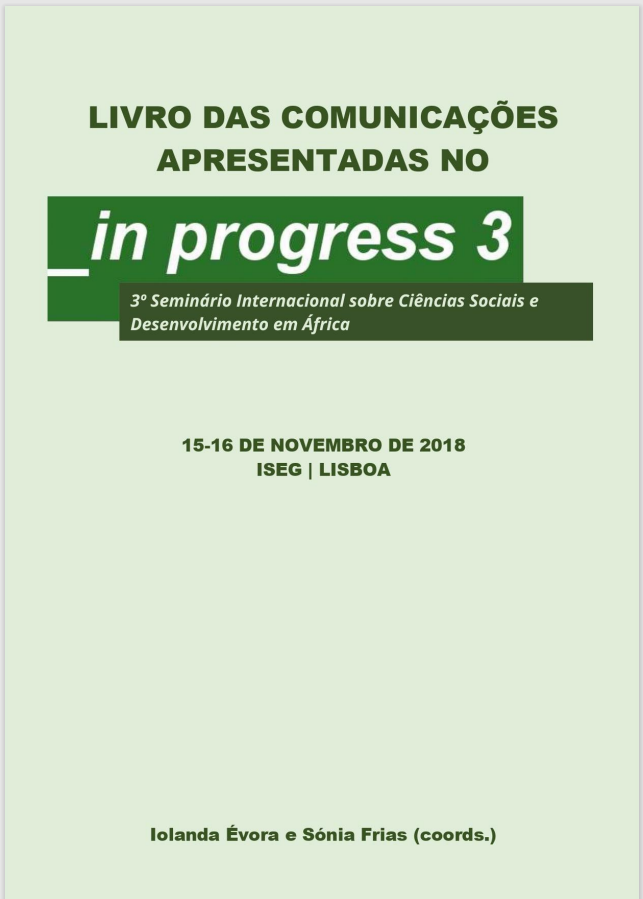
Book of Papers Presented at the In Progress 3 Seminar
Abstract:
This third edition of In Progress, Seminar on Social Sciences and Development in Africa brings together works by researchers and postgraduate students whose study and research theme is contemporary Africa and its development, supported by scientific currents that stimulate new approaches beyond the “development”, exploring the notions of “well-being” or “good living” and remaining close to currents of thought and debates between Africa, Asia and Latin America. The texts include themes such as: fieldwork: practical, theoretical and methodological issues; politics, civil society dynamics, development; culture, thought and change; strategies for cooperation and development; and populations, mobility and well-being. The second part of this work contains the reflections of the speakers invited to the In Progress 3 seminar, which include both a critical perspective on the dominant discourses and methodologies in the field of development policies linked to mobilities, economy and identities, as well as the contribution of financial growth for economic growth and several of the issues to be taken into account in discussions on economic sustainability, taking the example of SADC member countries. The final conference refers to the times and questions that are important to retain and what is important to reflect on in the context of social and human sciences, in particular, when the debate is about the (neo)colonial perspective and contemporary global challenges for African Studies.
Cite this e-book:
Évora, Iolanda e Sónia Frias (coord). 2024. Livro das Comunicações Apresentadas no In Progress 3 com Revisão por Pares : 15 a 16 de Novembro de 2018 no ISEG/ULisboa. Lisboa: ISEG – CEsA

CEsA History Website and Brochure
The moment of celebrating 40 years of the foundation of CEsA, and 30 years of the creation of ISEG’s Masters in Development and International Cooperation, offers us a unique opportunity to remember the trajectory and legacy in the field of research in Portugal, with the launch of a website and a brochure on the history of CEsA: https://cesa.rc.iseg.ulisboa.pt/cesa-40-anos/

Development Studies Seminars 2024 | Where do we go from here? Navigating Power Inequalities Between Development NGOs in the Aid System
📢 ❗ Attention: Room change! The session initially planned for the Novo Banco Room (Quelhas Building, 4th floor) has been relocated to Auditorium 4 (Quelhas Building, 1st floor) to better accommodate the participants. ❗📢
The seminars are an initiative that, since 1991, promotes research carried out in the areas of study of MDCI/ISEG/ULisboa and PDED/ISEG/ULisboa.

Development Studies Seminars 2024
Topic: Where do we go from here? Navigating Power Inequalities Between Development NGOs in the Aid System
Presenter: Nicola Banks (The University of Manchester)
Date: May 16, 2024 (Thursday).
Hour: 6 pm to 8 pm (GMT/Lisbon)
Venue: Auditório 4, ISEG (Quelhas Building, 1st Floor, Rua do Quelhas 6, 1200-781, Lisbon, Portugal)
Free admission, in person event. We recommend prior registration on EventBrite, but the capacity of the room will be filled in order of arrival.
This event is public and will be recorded and photographed for publication on CEsA’s communication channels. If you do not wish to have your image photographed and/or recorded, please notify the event organizers in advance via email: comunicacao@cesa.iseg.ulisboa.pt
More information and programme: https://cesa.rc.iseg.ulisboa.pt/news/development-studies-seminars-will-kick-off-on-february-29-at-iseg-with-a-series-of-10-sessions-of-presentations-by-guest-researchers/
About this Session
Based on the report ‘Where do we go from Here? Navigating power inequalities between development NGOs in the aid system’, published in January of this year and written by Nicola Banks in co-authorship with Badru Bukenya, Willem Elbers, Innocent Kamya, Emmanuel Kumi, Lau Schulpen, Gijs Van Selm, Margit Van Wessel, and Thomas Yeboah.”
This research examines the extent and nature of concrete actions undertaken by Northern NGOs and Southern NGOs to tackle power asymmetries, explicitly comparing their understandings, perspectives and initiatives.
It comes as no surprise that most NGOs, whether from the Global North or South, believe that there is a significant power imbalance between NNGOs and SNGOs, with both sides reporting that their own partnerships are performing ‘better’ regarding power imbalances. Also on both sides, organisa- tions see ‘the bigger system’ as problematic.
This research reveals a shared understanding of and frustration around a global aid system founded on colonial legacies of inequality that raise serious questions about whether it is fit for purpose. Glob- al agendas and priorities are seen as dominated by Northern actors and interests, with funding sys- tems maintaining this hierarchy. Across all actors, funding is considered the primary source of power imbalances and dominates the priorities of NGOs in the North and South.
This raises the question of how to progress towards more equitable relationships between SNGOs and NNGOs (and the processes and outcomes in policies, programmes and funding within these) while simultaneously balancing this with the need for deeper systemic change.
About Nicola Banks (The University of Manchester)
Nicola started her research career in Dhaka, Bangladesh, where her research explored the nature of urban poverty and livelihoods dynamics across four informal settlements of the city. Following on from her PhD Nicola moved to Kampala, Uganda, where she was Head of BRAC Uganda’s Research and Evaluation Unit, managing the NGO’s research activities across Uganda, Tanzania and South Sudan. Returning to the University of Manchester in 2012, Nicola aligned these two research interests – urban poverty and young lives – in her ESRC Future Research Leaders Fellowship that explored the social and economic consequences of living in urban poverty in Dar es Salaam, Tanzania. Across the past decade Nicola has increasingly focused her research on the role of NGOs and civil society organisations in global development.
As a researcher committed to impact, Nicola is proud to have built on her research to launch a new social enterprise, One World Together, that provides long-term, predictable and unrestricted funding to local and community organisations in the UK and around the world and engages in new ways with a new generation of committed supporters of global development.
Author: CEsA Communication (comunicacao@cesa.iseg.ulisboa.pt)
Images: CEsA/Reproduction

Development Studies Seminars 2024 | Globalization and the World of Regions: Lessons from Africa and the Post-Soviet Space
The seminars are an initiative that, since 1991, promotes research carried out in the areas of study of MDCI/ISEG/ULisboa and PDED/ISEG/ULisboa.
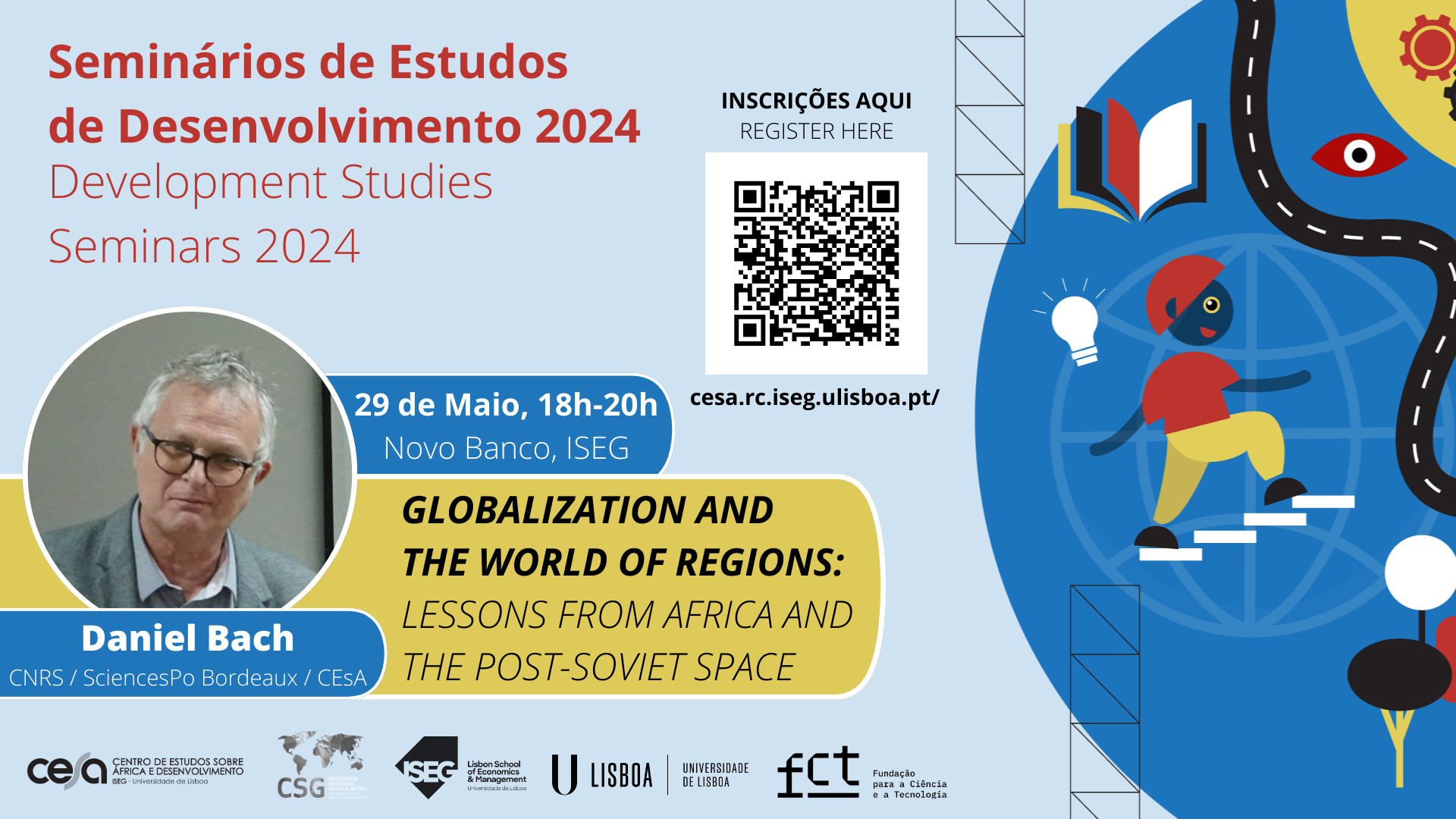
Development Studies Seminars 2024
Topic: “Globalization and the World of Regions: Lessons from Africa and the Post-Soviet Space”
Presenter: Daniel Bach (CNRS/Sciences Po Bordeaux & CEsA/CSG/ISEG-ULisboa)
Date: May 29, 2024 (Wednesday). Note: Originally scheduled for May 30, this session has been brought forward to May 29th for greater convenience.
Hour: 6 pm to 8 pm (GMT/Lisbon)
Venue: Novo Banco Room, ISEG (Quelhas, Rua do Quelhas 6, 1200-781, Lisbon, Portugal)
Free admission, in person event. We recommend prior registration on EventBrite, but the capacity of the room will be filled in order of arrival.
This event is public and will be recorded and photographed for publication on CEsA’s communication channels. If you do not wish to have your image photographed and/or recorded, please notify the event organizers in advance via email: comunicacao@cesa.iseg.ulisboa.pt
More information and programme: https://cesa.rc.iseg.ulisboa.pt/news/development-studies-seminars-will-kick-off-on-february-29-at-iseg-with-a-series-of-10-sessions-of-presentations-by-guest-researchers/
About Daniel Bach (CNRS/SciencesPo Bordeaux & CEsA/CSG/ISEG/ULisboa):
Daniel Bach is Director of research emeritus of the CNRS (Centre national de la recherche scientifique) at the Emile Durkheim Centre ‐ Comparative Political Science and Sociology, University of Bordeaux. He holds the Diplôme d’Habiliation à Diriger des Recherches (Bordeaux I University), a D. Phil from Oxford University, a master (DES) from Paris I (Panthéon‐Sorbonne University) and a BA from Sciences Po Grenoble.
He has taught at Obafemi Awolowo University, Ife‐Ife (Nigeria), the University of Montréal, ISCTE in Lisbon, Boston University, Ritsumeikan University, University of Kobe and the Luis Guido Carli, Rome. A former Director of Centre d’Etude d’Afrique noire of Bordeaux, he was a Deakin Fellow at St Antony’s College (Oxford University), a Fulbright scholar (Boston University) and a Fellow of the Indian Council for Social Studies Research (Jawaharlal Nehru University).
He has published on Nigerian federalism, the foreign policies of Nigeria and South Africa, regional organisations and regionalisation processes in Africa, as well as on relations between France, the European Union, China, India and Africa.
Daniel Bach is the series editor of the Routledge studies in African Politics and International Relations. His book on Regionalism in Africa ; Genealogies, institutions and trans-state networks ( Routledge, 2016) received the Past Presidents’ book award of the Association of Borderlands Studies(ABS) in June 2021.
Author: CEsA Communication (comunicacao@cesa.iseg.ulisboa.pt)
Images: CEsA/Reproduction
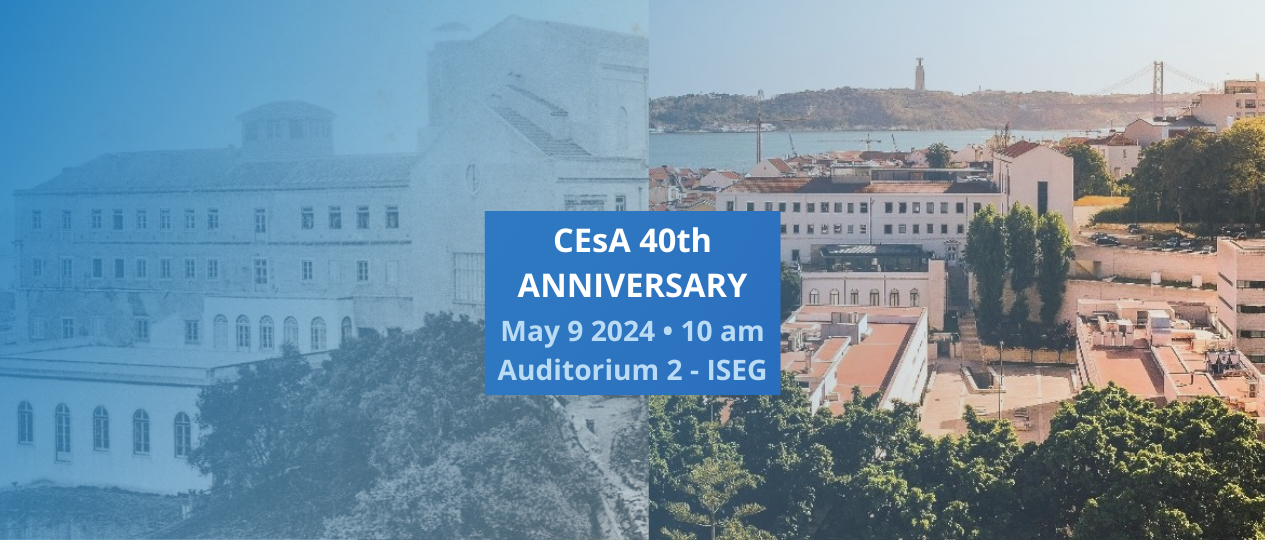
CEsA 40th Anniversary and MDCI 30th Anniversary
Join us in celebrating the 40th Anniversary of the Foundation of CEsA – Centre for African and Development Studies, a reference in Portugal in Development Studies since 1983! At this conference, we will also mark the 30th Anniversary of the creation of ISEG’s Masters in Development and International Cooperation. We will close with the launch of the book “Crónica das Ilhas”, written by José Luís Mascarenhas Monteiro. Register here!
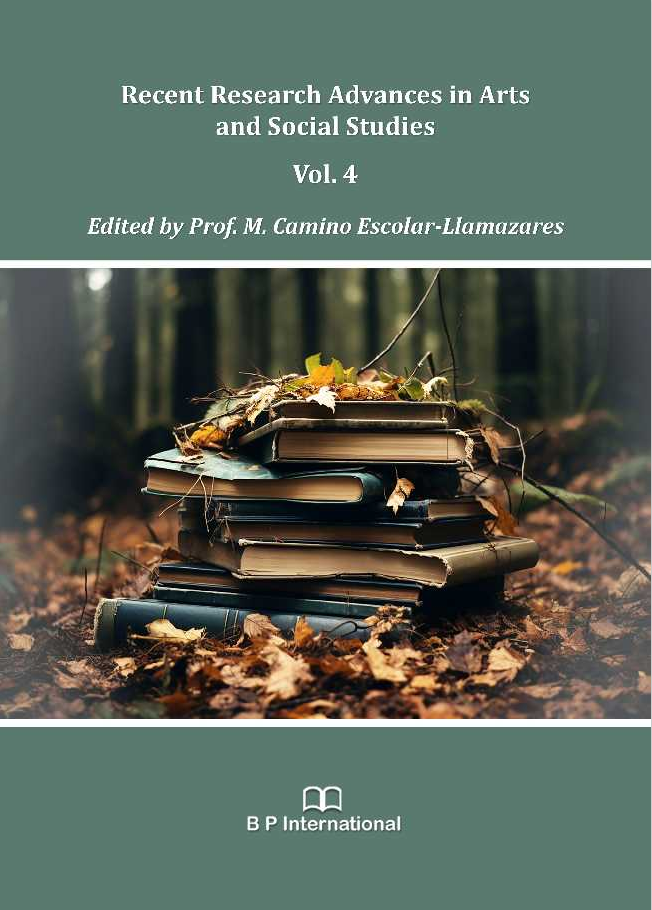
The Values of Portuguese International Development Cooperation: Review and update after 2013
Abstract:
In recent years, International Development Cooperation has assumed particular importance in scientific research and there are currently several studies of general scope or limited to a smaller geographical or thematic space, such as those that focus on national cooperation policies. In general, these works have sought not only to explain its historical, institutional and strategic evolution, but also to constitute a basis for reflection on a long journey of ideas, values and practices that it has been following and its results with partner countries. Portuguese Cooperation is no exception and, in general, all the publications that contextualize it refer directly or indirectly to the general values by which it is governed. However, there aren´t studies that identify the individual reference values of the action of the Cooperation actors in their practice of identifying, managing, and evaluating projects. In this article, we intend to identify the values considered as guiding principles of the action that the actors of the Portuguese Cooperation individually consider in the practices they develop. Such an intention constitutes a real innovation, since the only values identified so far are those that governments include in the strategies presented, more or less inspired by the documents of the European Union (EU) and the Development Assistance Committee (DAC) of the Organization for Economic Co-operation and Development (OECD).
Cite this paper:
Sangreman, Carlos e Raquel Faria (2024). ” The values of Portuguese International Development Cooperation: Review and Update after 2013″. In Recent Research Advances in Arts and Social Studies (Vol. 4), M. Camino Escolar-Llamazares (ed), 148-167. London: B P International
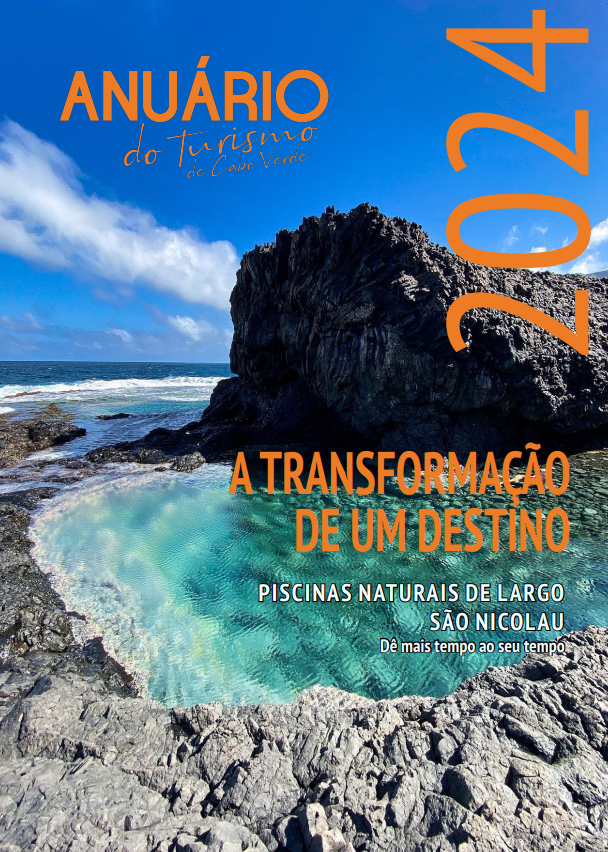
Turismo Costeiro e Marítimo em Cabo Verde. Rumo a um destino sustentável
Cite this paper:
Sarmento, E. (2024). Turismo costeiro e marítimo em Cabo Verde. Rumo a um destino sustentável. In Morgado, Carlos (2024). Anuário do Turismo de Cabo Verde 2024: a transformação de um destino (pp.30-32). Praia, Cabo Verde.
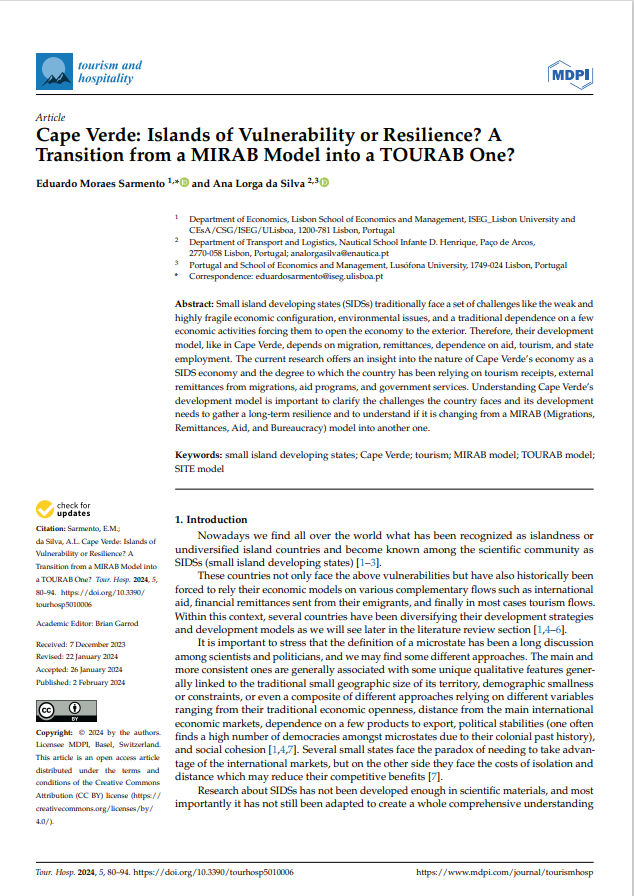
Cape Verde: Islands of vulnerability or resilience? A transition from a MIRAB Model into a TOURAB one?
Abstract:
Small island developing states (SIDSs) traditionally face a set of challenges like the weak and highly fragile economic configuration, environmental issues, and a traditional dependence on a few economic activities forcing them to open the economy to the exterior. Therefore, their development model, like in Cape Verde, depends on migration, remittances, dependence on aid, tourism, and state employment. The current research offers an insight into the nature of Cape Verde’s economy as a SIDS economy and the degree to which the country has been relying on tourism receipts, external remittances from migrations, aid programs, and government services. Understanding Cape Verde’s development model is important to clarify the challenges the country faces and its development needs to gather a long-term resilience and to understand if it is changing from a MIRAB (Migrations, Remittances, Aid, and Bureaucracy) model into another one.
Cite this article:
Sarmento, E.; Silva, Ana (2024). Cape Verde: Islands of Vulnerability or Resilience? A Transition from a MIRAB Model into a TOURAB One? Tour. Hosp. 2024, 5(1), 80-94; https://doi.org/10.3390/tourhosp5010006. MDPI. Special Edition Submit to Special Issue: Small Island Developing Countries (SIDS): Tourism between Innovation and Authenticity for Better Sustainable Developing Paths






